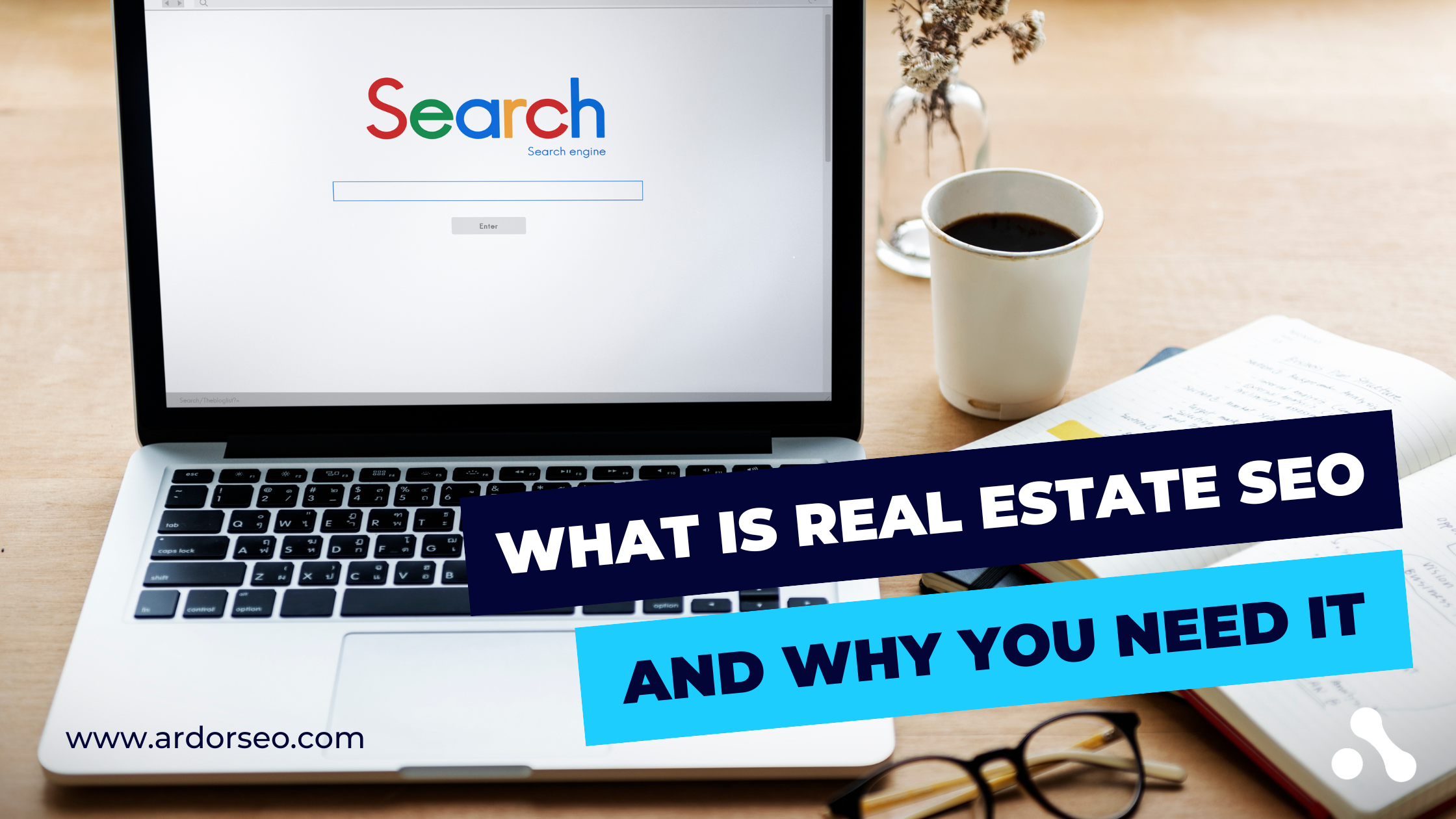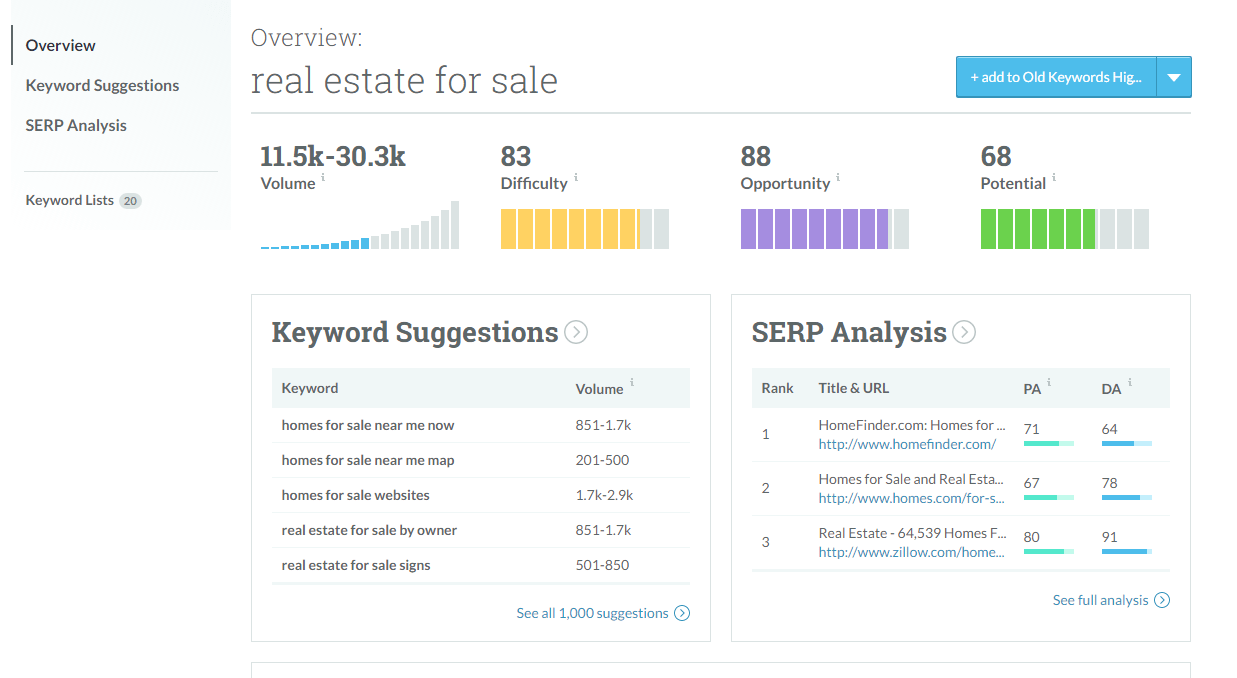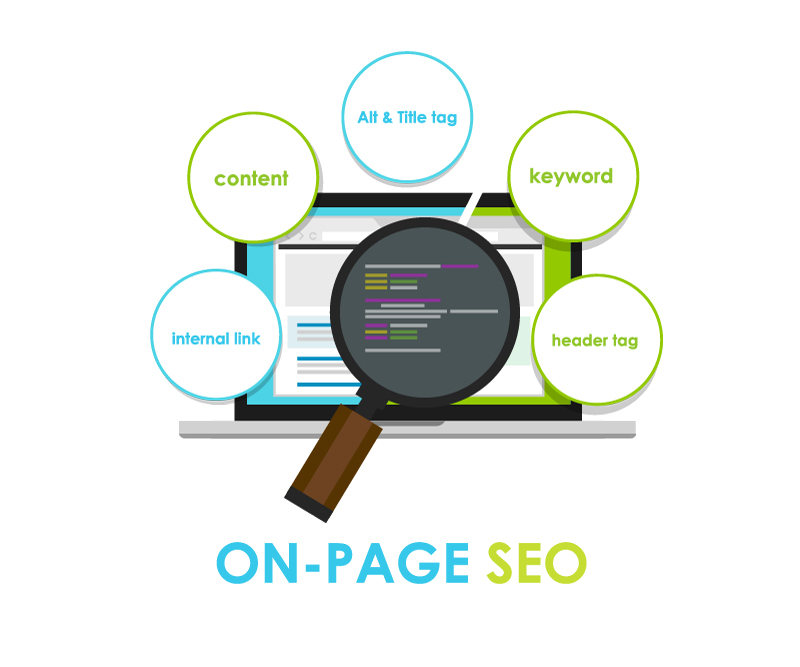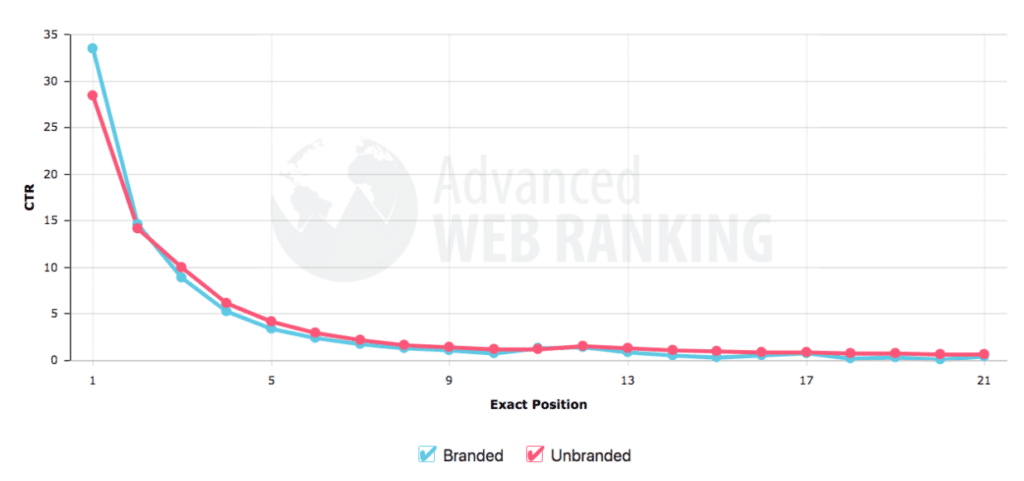REAL ESTATE SEO SERVICES FOR BUSINESS: GET MORE DIRECT LEADS
Our Happy Real Estate Customers





What is Real Estate SEO?
Think back to the dark era of the 1990s, if you owned a real estate company and wanted to generate leads to your listings newspaper ads were your first port of call.
Much has changed with the remarkable explosion in the global adoption of the internet. Today, over 80% of prospective home buyers are online and candidly seeking information and guidance from the internet regarding their home purchases.

The big question to ask yourself is: is my website, or business content, appearing on search engine results pages (SERPs) for searches made by potential home buyers? If not, you need real estate SEO! To put it simply: real estate seo gets your online business listings in front of the people most interested in them. It can be used to acquire more people selling their home and it can be used to find more interested buyers.
Let’s dig deeper into how you can get started, throughout this article we’re going to examine the tips you can use to take your real estate business to the top of Google rankings!
What does SEO mean in real estate?
The basic principle of SEO (search engine optimization) is targeting and then ranking higher for relevant keyword phrases related to your niche and services through keyword research.
Let us say a prospective home buyer searches on Google "how to sell a house fast in California". The people searching this are going to be viable leads for their business (if you operate in California). Wouldn't it be great to capture their contact information?
Well, with targeted real estate SEO you can. What you have to do is optimize your website for this keyword and after a thorough SEO campaign, your site should begin to appear at the top of SERPs related to real estate searches made in your service area.
How Does Real Estate SEO work?
Believe it or not, the internet isn't the complex enigma it may appear to be. It’s helpful to think of search engines more like libraries.
What Google does is sift through their libraries of information whenever you ask it something. This is achievable by running a quick search through its index and returning the most relevant information for your search.
Manually searching these billions of pages (as you would in a physical library) and returning the best most relevant content to the searcher in only a couple of seconds is a really difficult task. To put it in perspective, Google executes 2 trillion searches every day in 2022.
So a top search provider for real estate, like Google, Bing, Yahoo, and other search engines are actively crawling the web 24/7. Their algorithms are relentlessly searching for top-value content to feed their audience in their search queries. When they find a page they deem high-quality they archive it and file it under a category, which in our case is real estate.
Many factors aside from the keyword help the search engine crawlers to determine the niche of the website, including: how recent a particular piece of content is, the authoritativeness of the content in terms of the source's credibility, the screen size on mobile devices, the website loading speed, and whether your business is local.
What we’re trying to say is: Search Engine Optimization isn't about just increasing your website traffic, it’s about driving traffic from your target audience that converts. This is what you want as a real estate player.
Considering that SEO is organic, relatively cheap, and sustainable, you would be crazy to not want to incorporate it into your marketing and lead generation strategy.
Forget Cold Calling!

Make your customers chase you instead!
Get more Real Estate Leads now!
Why is SEO Important for Real Estate Lead Generation?
Many agents and brokers in the real estate industry spend lots of money on generating web traffic and lead generation. But in reality, very few channels promise them the ROI offered from real estate SEO.
The spectacular performance of SEO for real estate isn't completely unnatural, considering that 44% of contemporary home buyers search real estate listings on the internet first before proceeding to buy.

Here is something even more exciting. Almost 95% of homebuyers under 36 years have their purchase decisions directly influenced by content they consumed online. Sounds great right?
Well here’s the thing. 75% of internet searchers don't scroll past the first page. In fact, according to Backlinko, the first result in a Google search result gets a massive 32% of all total clicks.
If you put all these insightful statistics together, you get two notions: reaching the first page is imperative and you’ll be in serious money if your website content can get there.
This is what SEO is all about, pushing your website to the number #1 spot on Google for the terms your target audience is searching for. If you aren't there, you can be sure that your rivals who appear on these results are looting tons of customers – and consequently millions of dollars – from you.
Here is a question for you: are you going to allow this robbery to continue? No, what your website needs is SEO for real estate today!
Do Real Estate Agents need SEO?
Search engine optimization is a type of inbound marketing strategy for real estate, which means that your ideal customers find you rather than you going out to find them. The opposite of this approach is “outbound marketing,” which involves business owners actively reaching out to find customers through tactics like paid ads.
Imagine a world where your dream clients are consistently visiting your real estate website, handing you their contact information, and asking you to help them buy or sell a home, without having to spend anything on paid advertising?
If this sounds good to you, it's worth considering SEO for your real estate business.
SEO Services for Real Estate Investors
Real estate ranks Top1 out of our top 20 industries in generating ROI from SEO. The average real estate investment firm nets $3.6 million per year from their SEO campaign. Every dollar spent on SEO continues to work for you and deliver leads. Every real estate investment company can expect compounding growth for years after making the investment.
Benefits of SEO for Real Estate
For many real estate agents, SEO performance increase is what makes this dream a reality. With SEO, these agents attract reliable streams of motivated leads who are ready to buy or sell, directly to their real estate websites. They close more deals than their competitors as a result. Real estate agents who use SEO have more time to focus on selling homes and serving their clients rather than spending endless hours week after week on fruitless lead-generation activities.
If you're an agent who wants to get ahead of the competition, grow your business, and generate predictable streams of revenue and qualified leads to your website, SEO is the best marketing decision you can make. Here's why:
SEO Establishes Your Online Presence
The number of people looking to buy or sell their homes online continues to rise. It’s increasingly important to have a strong online presence so your business can be found by potential clients, and you can stay ahead of the market.
SEO Attracts a Steady Stream of Qualified Leads
Today, significantly more buyers search for their new home online, while fewer go by referrals. Therefore, it is critical to have a strong web presence if you’re looking for a dependable stream of clients to come to your business.
SEO Increases Your Website’s Online Visibility
While it may take time and effort, good SEO allows you to rank higher in the Search Engine Results Page (SERP), which attracts more people and improves your online presence.
Is SEO services still relevant in 2022?
It is laughable when people ask us if SEO is still relevant today. Here is the befitting answer we give them: what is more relevant than SEO? Social media? Definitely not!
Considering the relative affordability and sustainability of SEO, we guarantee you would struggle to find a more viable real estate marketing tool. Unlike social media PPC, leads generated from SEO are long term and don't immediately dry-up when you stop investing money into the platform.
Let's take a look at the stats on SEO:
- According to the Search Engine Journal, 49% of marketers credit organic search (SEO) as their best rewarding marketing channel.
- 78% of location-targeted search queries result in customers buying offline from a vendor.
- 53% of American buyers first search about a product on the internet before deciding to buy or not.
- Businesses allocate an average of 41% of their marketing strategy to SEO.
- 34% of businesses allocate more than $1,000 monthly to link building (an SEO tactic)
Are you now convinced of the formidable power of SEO for your marketing? Here is the truth, if you doubt the relevance of SEO, it’s because you haven't seen tangible results.
This is most likely, and allow-us to say deserved, consequence of not doing your real estate SEO the right way. To help you accrue delectable results, we will be exploring some of our best working on-site real estate SEO tips.
Ready for the ride?
Get your keyword research right

Keyword research remains a fundamental pillar of real estate SEO strategies. You just can't adopt a scattergun approach of spraying random content about your website and expect it to pull in the targeted traffic you need/want to rank for.
Due diligence is needed to discover key terms your potential customers are including in their search queries. Specifically, you should aim to uncover less competitive relevant keyword phrases that the bulk of your rivals aren't fighting tooth and nail to rank for. This is almost free traffic if you optimize you rank your content for these strategic terms correctly.
In the case of Google Ads, you can pick out powerful key terms that have been pulling in your targeted audience. Admittedly, the data on these terms is not very specific, especially if you are not paying for Google Ads.
Unfortunately, the formidability of real estate SEO (in terms of the weight of results it accrues) is no longer a secret. Many of your rivals are already investing heavily in real estate SEO, hunting gluttonously for tips that will give them an edge.
Therefore, it is expected that ready terms like "buy house" have overwhelming competition. Those broad and shorter phrases – most times, using one or two terms – are called head keywords. And we'd advise you to think again if you're new to SEO and you want to rank for them.
Prioritize On-Page Optimization

Real estate SEO requires an emphasis on the strategic adaptation of specific on-page elements. This is particularly true for businesses targeting real estate SEO in their locality.
NAP
To optimize your site content for local search queries, you need to equip your site with personalized details like your business address, active phone numbers, and of course, your business name. Always remember NAP - name, address, phone number. You must replicate these specific details across your local citations and local listing.
Schema Tool Markup
On-page elements—like meta descriptions, title tags, body, copy, town, and state names – also play an important part. We recommend you maximize your Schema local markup to make sure your search visibility is more localized. This way, when search engines crawl your site, they can accurately tell that your content is specifically relevant for an exclusive demography.
XML Sitemap
Businesses in the real estate space need to create an XML sitemap, ensuring that search engines can index their listings.
Page Title
One crucial on-page element you need to get right is your title tag. Best practices demand your title to be furnished with your primary keyword. Yes, this is your <h1> tag. When you have the page’s primary keyword inserted at the beginning of your H1, it is significantly easier for your site to rank than when you have the primary keyword in the mid-region of your H1.
Meta Description
Next on our list of tips is your meta description. You may see meta as trivial, but search engines don't. When containing the right keywords, your meta gives Google and others a more accurate glimpse – in terms of the snippet – of your site.
Google always says that your meta doesn't directly affect your search engine rankings, but it directly affects your clickability in search engine results your potential site visitors get from their queries. Indeed, this would be the information Goggle would be presenting when that page is indexed. To a reasonable extent, your meta's attractiveness (and clarity) determines how attractive that page is to searchers.
This means your meta significantly affects your clickthrough rates on SERPs. Do you now see why you should invest in making your meta attractive?
Given that you need your meta to catch your prospective visitors within seconds, it pays to keep it as brief as possible while being appreciably descriptive. It is recommended that you keep your meta (the description) anywhere from 50 to 160 characters.
Broken links are a killer
Broken links not only question the integrity and reputation of your site, but it also disrupts the user experience when they browse your content. Critical broken links can trigger a slump in your conversion rates and a consequent drop in revenue accrual.
Broken links could result from outdated content, a change in domain CMS, or restrictions on external content introduced by the website's admin. Eventually, a pile of broken links scattered across your site will hurt your real estate SEO.
Screaming Frog SEO Spider and Google Search are two powerful technical SEO tools for scouring your real estate website content to pick out anchor text with broken links. Of course, there is a free version of screaming frog, so you wouldn't have to increase your real estate SEO overhead cost.
Using Screaming Frog is simple. All you need to do after downloading the tool is insert the URL of the site you want to crawl into the crawl box. When you hit "Run", screaming Frog executes a comprehensive search through your directory of links, analyzing errors and denoting pages that users can't access at present.
Leverage video marketing for your on-site SEO
Video content is a powerful digital marketing element. Sadly – and fortunately for you – many real estate agents have not yet realized the tremendous impact which video content can have on their Google rankings.
Studies have discovered that by incorporating video content onto your website, you can enjoy an astronomic 157% leap in your organic traffic. Want something more enticing? With video content, you reduce the bounce rate and increase visitor dwell time by 200%.
When you create and integrate a lovably crafted piece of video content and embed it onto your site, more people will link to you, simultaneously amplifying your real estate SEO rankings and brand awareness.
Reduce the load speed of your website pages
Few things kill your SEO potential quite as brutally as slow to load pages. Do you remember the weight of disgust you feel when a website takes forever to load when you browse the internet? Do you remember how quickly you jump off that site?
The same rule will apply to your site if it's slow to function. It's a fact that 53% of today's website visitors will exit a page that takes more than 3 seconds to load.
Loading speed is a strong determinant of the volume of conversions you get from a page. It has been found that just a second delay in your load speed will unforgivably trigger a 27% drop in conversion.
Google particularly detests slow loading pages, with page speed a significant part of the algorithm used for assigning rankingings in SERPs. Load speed is also extremely important in relation to searches made on mobile devices.
When Google realized that mobile browsing was becoming the most popular way to surf the web, it introduced it's mobile first policy.
Mobile first does exactly what it says on the tin. For people searching from on mobile devices, Google will pump their SERPs with mobile friendly websites that load spectacularly fast.
Several free tools, like Lighthouse tools and PageSpeed Insights, can help you figure out how to get your site loading faster, boosting the results from your marketing campaigns.
Use LSI (Latent Semantic Indexing) Keywords
LSI keywords are conceptually related phrases and terms that Google uses to gain a deeper understanding of the content on your website. They are connected to your primary keywords, but not as closely as secondary keywords, and they're important for on-page optimization. They help by adding additional relevant content that's linked to your subject. This offers Google's algorithms greater precision when evaluating the contents of your website and matching it to the people who search for it. LSI keywords ultimately make your on-page optimization rank higher in the SERPs.
Where previously, it may have been sufficient for someone selling homes in Georgia to write “homes for sale, Georgia” all over their website, nowadays Google is getting smarter. It wants to understand the general topic that your page covers, so to do this, you use LSI keywords to provide additional information about your subject. That way, Google shows your website to the targeted audience that is served by your brand.
To begin using LSI keywords, you first need to find them. Tools like Google Adwords Keyword Planner allow you to enter your primary and secondary keywords, then it will produce a list of related LSI words. All you need to do is select the LSIs you wish to use and add them to your website's content.
When you use LSI keywords, be sure to optimize the content. That means, instead of adding them verbatim, work them into sentences and include appropriate material concerning them.
Attractive headlines increase CTR

Many internet readers are impulsive searchers. If they see a headline which catches them on the first glimpse, chances are they will be clicking on that title.
This is only natural as attractive things are always compelling. Therefore, if you invest in spicing up the headline of your content with some excitement and suspense, you can trigger the searcher's curiosity. Curiosity = larger traffic.
With over 2 million blog posts published on the internet, and then reposted on social media, you can't afford not to stand out with your headline.
Content with dreary and lifeless headlines is almost sure of being passed by and ignored. Losing traffic this way is hugely frustrating considering the bulk of effort you have invested in crafting that fantastic content.
Powerful and exciting headlines work best. So instead of going with a dreary topic like "How to sell your condo", you can inject some life into the headline and go with more compelling search terms like "Try these secrets and sell your condo in 24 hours!"
Of course, you would click the second one if you were a site visitor, wouldn't you?
Never ignore Image Optimization
Here is another nugget on our list of real estate SEO tips. Studies have revealed that 78% of on-page SEO issues arise from wrongly or improperly optimized images. You may even have been guilty of this.
Optimizing your images is far more than curating the most breathtaking photos from stock images on your site. Many webmasters don't count it worthy of filling up the image meta-data when they publish them.
How many of us are diligent enough to incorporate keywords in the alt text, or fill up the description, title, and caption of each image? And how many webmasters check if the image is mobile friendly?
But it is important to input the correct details in the metadata for every image you publish. It is rewarding as appropriate image optimization can increase your traffic from Google Images by up to 37%.
Local SEO for Real Estate Agents
Local SEO is a goldmine when maximized accurately and can be a key part of your small business SEO strategy. Let us assume you were ranking for a long-tail keyword like "local real estate agent in Houston". If your online presence reasonably impresses a website visitor living in Kingwood (in Houston), he could readily connect with your company offline and seal the deal.
Here is something to blow your mind: according to Hubspot, 72% of buyers who carried out a local search would visit a store within five miles.
Want more? A study from Nectafy revealed that 88% of searches for local businesses on a mobile device would result in a call or in-person visitation to a company within 24 hours.
Now, how do you get your local SEO right as a real estate agent? We will tell you.
Leverage the Power of Google My Business
No disrespect, but if you are not already using GMB, or haven't claimed your business listing, you are not probably not serious about SEO. As a local business, you should be concerned about grabbing a sizable chunk of the real estate market in your service area via local SEO strategies.
Google leverages the 3-Pack method in displaying three businesses (or websites) for search queries related to the locality. Precisely, for local search terms like "commercial realtor near me", Google would rank at most three businesses.
As a real estate company or a local real estate agent, you must make sure you are not missing from this local business 3-Pack. You will agree that searchers place a bigger focus on organic search results furnished with Google Map directions, snapshots, reviews, and ratings.
Setting up GMB profile for your business
The first step to setting this up is visiting google.com/business, this is where Google accepts local SEO submissions. After landing on the page, you will be requested to fill in details such as your precise map location, the hours you run, your accessible phone number, business website, photos, and description.
We highly encourage you to have a 100% complete profile. Periodically, update your details to make sure the information there is up-to-date and relevant.
Also, we strongly advise you to keep the details consistent with what's included in your site's Schema markup. This goes a long way in signalling to Google which details it should allocate the most emphasis on. Google confirms accuracy by measuring Google My Business data against schema details like business address and phone number.
Adding the Schema Markup
It is crucial to stipulate the format of your real estate website's code structure to search engines. This is specifically what Schema Markup does for Google.
With Schema Markup, chances are higher that your content elements, like property pricing tables, are integrated into Google's rich snippets. This way, Google's instant answers can contain more insightful details like your property's prices or the square footage.
With such details, you would expect your clickthrough rates (CTR) to be boosted. Specifically, pages leveraging Schema markup enjoy up to a 25% leap in their CTR.
Take note that Google is quite stringent in the use of Schema Markup. This is to avoid the increasing cases of spammy schema markups in SERPs. The massive use of spammy schema structured data is sure to get you on Google's bad books.
Make sure your Schema accurately instructs search engines on details about that page. For example, a real estate website shouldn't be marking up a page meant for local residential real estate as commercial real estate.
Also, when optimizing for local search, something we would advise if your real estate agency only has a small service area, is always include your NAP - business name, address, and phone number. As we mentioned earlier it's crucial the details on your site are a precise match to the ones in your GMB profile.
Making the best of reviews
One of the best ways to boost your credibility in the real estate market is by piling up positive reviews. Unsurprisingly, 72% of your potential buyers will only take action after they have read a positive review about your real estate company.
Don't blame them, trust is quite a scarce commodity in the online world, and fewer people are willing to give you that benefit of the doubt if you have not established your legitimacy via reviews.
Indeed, reviews are critical determinants for your real estate SEO ranking in the SERP of buyers in your vicinity. Gathering positive reviews on Google, and even on third-party review websites like Yelp and social media platforms like Facebook will add to your local SEO efforts an incredible amount of good.
Not to mention, a link to your website from any third-party platform is an extra source of traffic that you can capitalize on.
Build Backlinks Into Your Real Estate Website
What are Backlinks?
SEO backlinks are links from other websites that point to yours. You can find them in anchored text in an informational article that will link directly to content on your real estate website for ‘further reading' or as an authority reference for a specific topic. Google views backlinks as a vote of confidence for your website, increasing your website's credibility (so you rank higher) and driving more traffic to your page.
Why Are They Important for SEO?
In SEO, backlinks are another tool that makes you rank higher in the SERPs. To get good backlinks, you need to identify a website with established authority in Google, and that contains content related to your website. Once you can get these websites backlinking to your web pages, Google understands that your content is a reputable reference for an authority website, which gives your site greater authority in Google.
Strategies to Build Backlinks for Your Real Estate Website
If you want to build up a good set of backlinks to your website, you first need to identify other companies' websites whose backlinks would provide value to your business! Tools such as MajesticSeo or Moz Open Site Explorer allow you to enter a website's address and show you a list of backlinks that point to it. Then you can select the sites you'd like linking back to your website and reach out for a link exchange.
When you get a backlink from a credible website, Google understands that your website is also a reputable and credible source of information. The more backlinks you obtain, the more credibility you have.
SEO abominations you should never make on your Real Estate Website
Keyword stuffing
So far, we have harped on about the importance of optimizing your content and blog posts with strategic real estate keywords (with impressive search volume and difficulty). Nonetheless, it would be foul play if you dubiously heap a particular keyword on a specific page.
Google doesn't tolerate keyword stuffing. Keywords shouldn't be inappropriately loaded into one sentence or paragraph on a page. As opposed to what you would think, it is not the more, the better when it comes to SEO strategy.
One variant of keyword stuffing is integrating key terms unnaturally into your general web design or any blog post in such a way that it ruins the reader experience.
Keyword cloaking is another black hat SEO tactic that will undoubtedly get your site penalized in SERPs. Here, webmasters would manipulate the CSS of a page of their real estate websites by using the same color background for the page as the text.
This is mischievously targeted at making a bulk of text invisible to the reader but rankable by search engines.
Writing Low Quality content
An important part of writing any form of content for your website is to write for people, not for search engines.
Google's priority is to the searcher, their goal is to provide the highest quality content that directly relates to the searchers' query. Google can tell when your page content is low quality based on things such as word count, word or phrase repetition, and whether your content includes essential words related to its topic.
If you need to create quality content, the easiest way to do so is by being original. Google looks unfavorably on plagiarized external content and internal duplicate content, whereby the same snippet of text is included across multiple site pages. By writing something totally unique, you'll get into Google's good-books!
Not updating existing Content
If you already have a back-log of content on your website, here are a few things you can do in 2022:
- Check to make sure all the information is up to date
- Consider cycling existing content through a different channel, such as social media or emails
- Ask yourself whether there are niche markets your business can tap into
Keep in mind, content that can be shared among family and friends of the networks you're distributing it to will propagate your message even faster.
Not Optimizing for Mobile
Not optimizing your website for mobile is one of the most harmful SEO mistakes you can make. Most people online are searching for products and services from their mobile or tablet portable device.
In our modern world, time and attention are of the essence. People don't want to spend more time than necessary waiting for a website to load anymore, so if your website is not optimized with fast loading times for mobile devices, people are not going to wait around. If you're not optimized for mobile, you will drive search traffic away from your website before your leads have the chance to seriously consider engaging with your services.
What does SEO cost in 2022?
If this article has done its job, around now you should be curious about how much real estate websites should budget for search engine optimization.
The truth is there is no definitive price for real estate SEO services. Your budget should reflect the range of search engine optimization. services and local campaigns you need. If you've already dabbled in SEO and gotten some positive results, there should be less to do.
Search engine optimization for a small realtor site with say 10 pages will cost far less than SEO for a prominent real estate company with over 20,000 properties on their website.
Indeed, search engine optimization costing would vary from one SEO agency to another. On average, depending on the kind of SEO campaigns the agency would run for you, you can expect to pay anywhere from $500-$10,000 on a monthly retainer. If you don't have to go on a monthly retainer service, you could pay for on-demand custom SEO projects.
Conclusion
Here we are. This was an encompassing guide on what every real estate agent should know about SEO in order to drive qualified local leads to the homes for sale on their website. We have expansively covered the hacks and the mistakes you should steer clear of, so that you can pursue your SEO projects.
Rounding off, invest in quality, genuine, and sustainable real estate SEO services. No one said it was easy. Yes, it takes effort, but it will always be exponentially rewarding at the end.
Ardor SEO company is home to some of the greatest Real Estate SEO experts you could ever hope to come across. Across the years, we have made multitudes of realtors stinking rich by cementing their place at the top of potential customers' SERP, loading these real estate companies with qualified local leads.
We invite you to come and have your slice of the fortune. Reach out to us today, let us discuss how our Real Estate SEO company can get you appearing top on the eyeballs that matter.
One small step for your website,
one giant leap for your leads
Enter your details below and one of our
real estate SEO specialists will be in touch
Here’s what our customers are saying

Dwaine Clarke
GCT Net Lease
Since working with Kris & his team from Ardor SEO, my business has exploded.
I average over 283 leads in a month, that is 9.4 leads per day.
My biggest problem is having enough properties.

Avery Carl
The short term shop
I grew from $59MM in 2019 to $158MM in 2020. This year, we're on track to hit 800 homes and over $400MM in sales!
Hiring Kris and hiring more Agents are the only thing we did differently!

Tim Stout
Tim Stout and associates
I've been with Kris Reid and ArdorSEO for about a year and a half now and i've seen dramatic difference in the Organic traffic that my website receives.
I get massive leads to buying customers. The goal of any business is to create income to a lead source that you don't have to continue to pay for.
Working with Kris and his team, i am able to create something thats gonna be evergreen and continue to produce lead source.
I definitely recommend giving them 5 out of 5, and would recommend anybody that needs help with SEO, Websites and levitating.
Still Need More Convincing?
Listen to the Real Estate Podcast I have appeared on!


